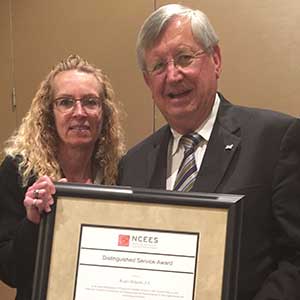Calendar Icon
Jul 29, 2015
![]() RSS
Submit a Story
RSS
Submit a Story

Nebraska Engineering College Advisory Board member Roger Helgoth was recently honored with the National Council of Examiners for Engineering and Surveying (NCEES) 2015 Central Zone Distinguished Service Award.
Helgoth, the president emeritus of Kirkham Michael and secretary for the Nebraska Board of Engineers and Architects (NBEA), has been a member of NCEES since 2002. He is currently serving as chairman of the Committee on Education, working on multiple committees and advocating for the professional licensure of engineers.
NCEES is a national nonprofit organization that is dedicated to advancing professional licensure for engineers and surveyors. It develops, administers and scores the examinations used for licensing in the United States.
Streamlining and standardizing the various state requirements for licensure is one of Helgoth’s top interests in his NCEES committee work.
“We have issues in the NCEES because the licensing process for engineers is for protecting public health, safety and welfare, and each state is responsible for implementing their own licensing act,” Helgoth said. “Thus, states have their own methods of how they license engineers and implement continuing education.
“The issue of mobility is most important to engineers of the future. (But) if you want to be licensed in multiple states, that’s an administrative nightmare. Our Education Committee is determining ways to protect the integrity of the process while building consensus for streamlining the process.”
While making the process of licensure less complicated is important, Helgoth said finding a way to get more engineers to become licensed is just as much a priority. Currently, Helgoth said, only about 20 percent of engineering graduates take licensing examinations.
The process begins with the Fundamentals of Engineering exam before graduation and, Helgoth said, progresses to licensure with experience by taking the Professional Practices Examination.
“I am absolutely passionate about getting greater participation in licensure by encouraging engineering students to begin the process before they leave the College of Engineering,” Helgoth said. “We need to continue to emphasize the career opportunities to women and minorities as a career of choice. There is absolutely no reason why 40-50 percent of our engineers shouldn’t be licensed with greater diversity as well.”
Helgoth said nearly everything in our cultures and societies – drinking water, bridges and highways, buildings, energy, healthcare among them – and engineers are a major part of the process of delivering those things.
“Once you go through the steps of becoming a licensed professional, which is a privilege, you know you have significant responsibilities, and that’s first in your mind,” Helgoth said. “Besides it being your ability to earn a living and your opportunity to lead projects, you become a key professional linked to the protection of health, public safety and public welfare.”
Helgoth, the president emeritus of Kirkham Michael and secretary for the Nebraska Board of Engineers and Architects (NBEA), has been a member of NCEES since 2002. He is currently serving as chairman of the Committee on Education, working on multiple committees and advocating for the professional licensure of engineers.
NCEES is a national nonprofit organization that is dedicated to advancing professional licensure for engineers and surveyors. It develops, administers and scores the examinations used for licensing in the United States.
Streamlining and standardizing the various state requirements for licensure is one of Helgoth’s top interests in his NCEES committee work.
“We have issues in the NCEES because the licensing process for engineers is for protecting public health, safety and welfare, and each state is responsible for implementing their own licensing act,” Helgoth said. “Thus, states have their own methods of how they license engineers and implement continuing education.
“The issue of mobility is most important to engineers of the future. (But) if you want to be licensed in multiple states, that’s an administrative nightmare. Our Education Committee is determining ways to protect the integrity of the process while building consensus for streamlining the process.”
While making the process of licensure less complicated is important, Helgoth said finding a way to get more engineers to become licensed is just as much a priority. Currently, Helgoth said, only about 20 percent of engineering graduates take licensing examinations.
The process begins with the Fundamentals of Engineering exam before graduation and, Helgoth said, progresses to licensure with experience by taking the Professional Practices Examination.
“I am absolutely passionate about getting greater participation in licensure by encouraging engineering students to begin the process before they leave the College of Engineering,” Helgoth said. “We need to continue to emphasize the career opportunities to women and minorities as a career of choice. There is absolutely no reason why 40-50 percent of our engineers shouldn’t be licensed with greater diversity as well.”
Helgoth said nearly everything in our cultures and societies – drinking water, bridges and highways, buildings, energy, healthcare among them – and engineers are a major part of the process of delivering those things.
“Once you go through the steps of becoming a licensed professional, which is a privilege, you know you have significant responsibilities, and that’s first in your mind,” Helgoth said. “Besides it being your ability to earn a living and your opportunity to lead projects, you become a key professional linked to the protection of health, public safety and public welfare.”
Submit a Story